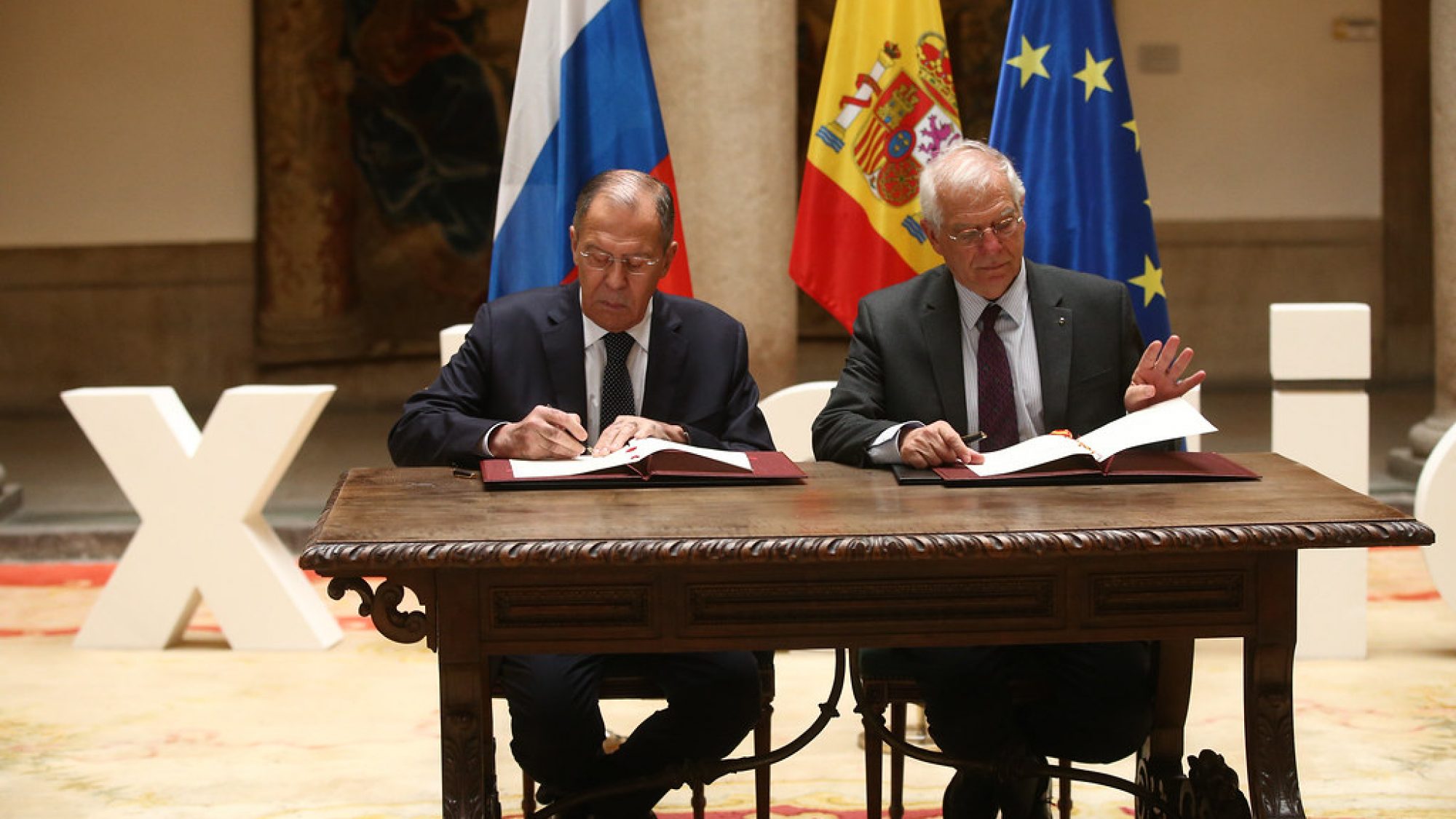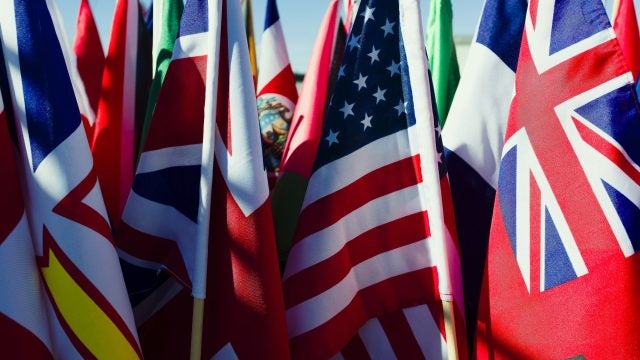
Title: The Tip of the Iceberg or a New Low in EU-Russian Diplomatic Relations?
This article examines current diplomatic relations between the European Union (EU) and Russia. It argues that despite the severe strains in the relationship, cooperation between EU member states and Russia regarding containing COVID-19 can take place in the short-to-medium term. However, in the long-term, EU-Russian contestation over human rights, freedom of speech and violent clampdowns of the political opposition in Russia will outweigh these short-term gains in cooperation.
Introduction
The aftermath of the poisoning of Alexei Navalny, the leader of the political opposition to President Putin, caused deep frictions compounding the pre-existing tensions in EU-Russian relations. After a moment of diplomatic courtship at the end of the Yeltsin era, a series of increasing confrontations since President Putin’s first term in 2000 transformed EU-Russian relations. Divergent stances among EU member states regarding the scope of the EU’s engagement with Russia, and President Putin’s preference of bilateral relations with EU member states over engaging with the bloc as a whole undermined the relationship. Other factors shaping the shift from courtship to cooperation in the relationship were the repercussions of the EU’s Eastern enlargement in 2004, and Russia’s increasing authoritarianism since President Putin’s second term.
Furthermore, the stationing of Russian troops in Eastern Ukraine in Spring 2021 heightened tensions in relations between Brussels and Moscow. The case of Navalny, the military build-up in Ukraine, and the tensions following a meeting between the Russian Foreign Minister Sergei Lavrov and the EU High Representative of the Union for Foreign Affairs and Security Policy/Vice-President of the European Commission Josep Borrell Fontelles are the latest trends in EU-Russian diplomacy. These tensions are likely to outweigh potential short-term gains of cooperation currently exemplified by the use of Russia’s COVID-19 vaccine Sputnik V in several EU member states.
Current strains in EU-Russia relations
The context for the current course of EU-Russia diplomacy unfolded during a meeting of Borrell Fontelles with Sergei Lavrov in Moscow on February 5, 2021. In this meeting, Borrell Fontelles sought to address the situation regarding Navalny, the leader of the political opposition to President Putin, who was poisoned with the nerve agent novichok in August 2020. In the aftermath of this poisoning, the EU and the US implemented a series of sanctions against Russia, which were, according to officials in Germany, a response to Russia’s breach of democratic values, international law, and human rights. However, German officials have not considered revising their plans regarding the Nord Stream 2 – a soon-to-be completed pipeline transporting Russian gas to Germany through the Black Sea – despite its highly contested nature. The agreement between Germany and the US on a deal completing Nord Stream 2 on July 22, 2021 is the latest example of the importance of cooperation in energy policy with Russia despite tensions in other issue areas such as human rights.
Notwithstanding this cooperation in energy policy, EU member states remain divided in their stances towards Russia. The EU’s internal division in its stance towards Russia undermines the EU’s ability to develop a constructive and unitary approach in its relationship with Russia, which diminishes the EU’s unity in the eyes of some Russian policy makers.
After their meeting on February 5, 2021, Sergei Lavrov countered Borrell Fontelles’s aspiration to discuss the Navalny case by characterising the EU as an ‘unreliable partner’. In response, after returning from his visit to Moscow, Borrell Fontelles labelled Russia an authoritarian state. This diplomatic escalation signifies the lowest point in EU-Russian relations in the last two decades. Cooperation in some issue areas is possible in the short to medium-term, but significant contestation over human rights, the role of the political opposition in Russia, and controversial constitutional reforms allowing President Putin to run for another two terms impair the relationship in the long-term.
Which way forward in EU-Russian diplomatic relations?
In the short-term, a moment of cooperation in EU-Russian diplomatic relations is reflected in some EU Member states’ use of the Russian vaccine against COVID-19. However, this cooperation merely remains a symbolic gesture if the current tensions in EU-Russian diplomacy are not eased to facilitate a sustainable diplomatic dialogue.
A constructive dialogue needs to be adopted by both EU and Russian policy makers. Despite the severity of tensions in the relationship, the basis for diplomatic negotiations must be respectful dialogue. Lavrov’s condemnation of the EU as an unreliable partner and Fontelles’s labelling of Russia as an authoritarian regime do not facilitate constructive discussion. The conflict between these diplomats was sparked by the protests against Navalny’s imprisonment. However, these tensions are merely a fraction of the broader ideological differences between the EU and Russia.
The EU’s emphasis on core values essential in a liberal democracy are not compatible with those of a sovereign democracy, a term coined in 2006 by the first Deputy Chief of the Russian Presidential Administration, Vladimir Surkov. Sovereign democracy is a form of democracy in which the state plays the central role in managing politics while objecting to external interference in domestic affairs. This contestation over values has undermined EU-Russian diplomatic relations at various moments since Putin’s election as president in March 2000. These contentions centre, among others, around human rights, freedom of expression, the role of the political opposition in Russia, the role of NGOs, and the treatment of minorities. In 2008, the chairman of the Council for Foreign and Defence Policies Fyodor Lukyanov stated that Russian foreign policy was “marked […] by a concept according to which Russia should retain the freedom of action and seek the consolidation of its independent position on all issues.” This emphasis on independence undermines the facilitation of mutually accepted terms and conditions based on trust as a foundation for sustainable diplomatic dialogue between the EU and Russia.
A diplomatic agenda for a constructive way forward in the relationship must clearly set out expectations and measurable objectives by both parties, which need to follow a jointly agreed timeline. In the case of non-compliance with these terms and conditions, clear criteria have to be put in place. This process reflects the pre-negotiation stage, the formula stage, and the detail stage in diplomatic negotiations. Diplomatic practice has shown that these stages are intertwined. In some cases of difficult diplomatic negotiations, the terms and conditions of the pre-negotiation need to be altered. However, these three stages could be the basis for constructive EU-Russian diplomacy.
Constructive dialogue should be followed by a mutually accepted political agenda. This agenda should consist of clear objectives in specific issue areas, such as the latest cooperation in the struggle against COVID-19. Several EU member states, such as Hungary and Greece, are using the Russian vaccine Sputnik V to tackle the domestic health crisis even though it has not yet been approved by the European Medicines Agency (EMA). The Russian vaccine is under review until there is sufficient evidence based on clinical trials to ‘apply for marketing authorisation.’ This vaccine allegedly effectively protects against COVID-19 in approximately 92 percent of cases.
In March 2021, the Prime Minister of the Slovak Republic bought 2 million doses of Sputnik V to curb infections without the vaccination’s medical approval. An unfolding domestic political crisis in the Slovak Republic demonstrated the controversy regarding this vaccine. This controversy was exemplified by the Slovak government’s decision to return the doses to Russia due to the population’s hesitancy of receiving the vaccine without prior market approval. Other EU member states are still considering purchasing doses. Austria announced that it would purchase the Sputnik V vaccine after the EMA’s approval. Italy and France expressed their interest in Sputnik V during discussions with President Putin. Chancellor Angela Merkel stated that the German government’s decision on whether to purchase Sputnik V would depend on when the EMA grants its approval, given that other vaccines would have been supplied in the meantime.
Time will tell whether discussions on adopting Sputnik V in some EU member states are mere diplomatic rhetoric. Regardless, deliberations over whether to order Sputnik V reflect a division among EU member states. The exchange of this vaccine would be mutually beneficial and could contribute to positive bilateral relations between individual EU member states and Russia in the short-to-medium term. However, severe tensions in current EU-Russian relations centred around human rights, infringements of international law (as exemplified by Russia’s annexation of Crimea in 2014), and wide-ranging skepticism about the efficacy of Sputnik V outweigh the significance of cooperation in containing the pandemic.
…
Dr Anna-Sophie Maass is a Lecturer on International Relations and Diplomacy in the Department of Politics, Philosophy and Religion at Lancaster University, UK. Prior to working at Lancaster, she lectured at the University of Groningen and the College of Europe, Natolin, Warsaw. Her research focuses on EU-Russian relations, EU foreign policy in the former Soviet space, and Russian politics.
Image Credit: “С.Лавров и Ж.Боррель | Sergey Lavrov and Josep Borrell” by МИД России / MFA Russia is licensed under CC BY-NC-SA 2.0
More News

This article compares U.S. and Chinese approaches to artificial intelligence (AI) exports in Africa and examines how these disparate approaches have produced both downstream benefits and challenges for the region.

On May 20, 2025, the World Health Assembly unanimously adopted the World Health Organization (WHO) Pandemic Agreement, an international treaty designed to strengthen pandemic prevention, preparedness, and…

As the Trump administration proposes a sweeping overhaul of the US foreign assistance architecture by dismantling USAID, the Millennium Challenge Corporation (MCC), and restructuring the State Department, there is an…